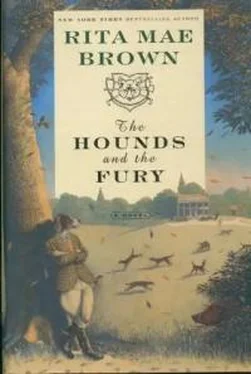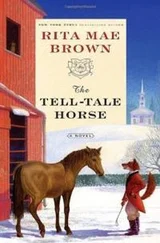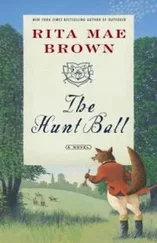“Paperwork from Farmers Trust will be walked over this morning.”
“What are you trying to do? Bury me in paperwork?”
“It is all coming down at once, I know.” He slid his right hand into his pocket. “If I don’t buy aluminum now at this price, I’ll pay through the nose by spring. Between the Chinese and Hurricane Katrina’s aftermath, I’m lucky to get this price. Everyone needs aluminum.”
“I’ll get right on it.” Her tone was conciliatory, but she didn’t apologize for her earlier surliness. “If for some reason this isn’t feasible—I mean that in terms of the interest rates, of course—we’ll get more credit, but it might make sense to float a short-term loan for the purposes of buying the aluminum. I’ll call around and check the interest rates. Could have asked yesterday when I was down in Richmond.” She mumbled, as if to herself. “No point paying more interest than needs be.”
“Good idea, but bear in mind we want to keep our relationship with Farmers Trust strong.”
She turned her wheelchair away from the screen. “Money talks. Bullshit walks.”
“Right.” He left the office, but they did smile at each other.
That evening, the snow, having fallen steadily all day, although not heavy, accumulated six more inches. The sun set just before five. The long twilight, enlivened by flakes turning from white to pink to blue, finally surrendered to darkness.
Raleigh and Rooster slept in their large fleece-lined dog beds in the kitchen while Sister fiddled with garden plans spread over the table, knowing that the best time to plan a garden is in the dead of winter. Colored pencils filled a white ceramic jam jar.
Humming to herself, she drew a purple line around a corner bed. “More iris. Masses of iris.”
Golly, on the table holding down the papers, flicked her fluffy tail. “Catnip. Don’t forget to plant catnip.”
The phone rang. Sister rose to lift the receiver off the wall phone. “Hello.”
“Sister, it’s Tootie.” None of Anne Harris’s fellow students at Custis Hall called her anything but Tootie, nor did anyone else.
“How good to hear your voice.”
“I wanted to hear yours.” Her young voice betrayed her loneliness.
Sister heard the emotion. “The hounds will be glad to see you. Mrs. Norton and Bunny hunted yesterday. Great day, really. You would have loved it.”
“We’ll be back on Wednesday the fourth, so if Bunny says it’s okay, I can hunt Thursday. I miss it. Hope Val and Felicity can come, too.” She named her two best school friends.
“I’ll cross my fingers,” Sister replied.
Tootie said, “Wonder when we’ll find out which colleges accepted us? Dad really wants me to go to Princeton.”
“It’s a great institution.”
A long pause followed. “I know.”
“Tootie, you have a little time to sort this out. I know you aren’t too enthused about Princeton even though you applied. It will all work out, one way or t’other.” She used the old pronunciation “t’other.” She added, “And you can always talk to me.”
“And Iota.” Tootie mentioned her horse, already feeling better.
“Iota knows more than all of us.”
Sister hung up and returned to her rough drawings. Golly, paw on colored pencils, was now sprawled over them. Judging from the teethmarks, Sister surmised the calico favored something yellow.
The phone rang again. It was Anselma Wideman, who with her husband a year ago had bought Little Dalby, a lovely old place of two thousand acres. The middle-aged couple dedicated themselves to refurbishing the house, restoring the outbuildings.
Once owned by the Viault family, it had been one of the main fixtures used by the Jefferson Hunt. When the last Viault died, the place, sliding downhill anyway, picked up speed, so the Widemans’ efforts were welcomed by hunters as well as by those who valued architecture and history.
“Sister, Harvey and I agreed to allow Crawford to hunt Little Dalby. He said he wouldn’t be here when you are, and Marty has been so good to us, I didn’t see how we could refuse.”
Marty Howard, Crawford’s wife, had designed and helped renovate the house gardens at Little Dalby. She and Anselma had become friends in the process.
“I understand, and I’m sure Crawford and I can work out some accommodation.” Sister hung up and cursed, “Goddammit, it’s already started.”
CHAPTER 6
Central Virginia Medical Center, although not part of Jefferson Regional Hospital, sat two blocks away from that highly respected institution. Many of the doctors at JRH, as they referred to it, rented space in the two-year-old complex.
A lovely black band of bricks in a diamond pattern halfway up the four-story structure broke up the red brickwork. The large double-paned windows allowed much natural light into the rooms.
What was distinctive about the offices was their layout. The developer, Melvin Sweigart, knew physicians liked to group together by specialty, if possible. He figured it was the same principle as car dealers setting up shop next to one another.
Melvin had created internal squares, small quads. The offices surrounded the quads, and hallways connected the various quads.
Garvey Stokes had made special stainless steel sinks and tables for the center, as some procedures could be performed in the office. This saved a patient money.
The cardiac quads were on the first floor. The cancer quads were on the second. The third floor was dedicated to sports medicine. The top floor, flooded with light from gorgeous pyramidal skylights, housed the plastic surgeons.
A further advantage of this arrangement was it allowed the doctors in the various specialties to pool their resources if they wished.
Walter Lungrun and his associates bought the highest-tech heart monitors available, just as Jason Woods and his associates purchased an x-ray machine for forty-two thousand dollars.
The sports medicine group on the third floor went so far as to buy a magnetic resonance imaging machine for eight hundred thousand dollars. The other physicians rented time on it.
While the hospital provided this equipment, too, the doctors at Central Virginia realized nine out of ten people never want to set foot in a hospital. The antiseptic odor alone upset people, and the impersonality of it added to the psychological discomfort.
The more procedures that could be performed in this pleasant environment, the better from the patient’s point of view.
Business exploded. Walter had just hired another nurse, and Jason had to hire another head nurse and another secretary. Even with those expenses and the exorbitant insurance the doctors were forced to carry, they made money.
So successful was the design for Central Virginia Regional Center that Melvin Sweigart was buying up old houses downtown to build another. Crawford Howard was a partner in this enterprise. He was considering buying out the company that disposed of waste—biological hazards, as they were now coined—since he thought he could do this more profitably than Sanifirm.
While the snow continued to fall, the survivors’ party hit high gear at seven in Jason’s quad.
Birdie Goodall, a pert thirty-two, office manager for this quad, ladled out the nonalcoholic punch.
Iffy held out her glass cup. “Did you put ginger ale in for sparkle?”
“I did.”
Alfred DuCharme tiptoed behind Iffy, reached around, and, holding a paper bag with a bottle inside, poured in a touch of something stronger. “Here’s your sparkle, girl.”
Birdie winked at Alfred. “Works for me.”
He reached over and poured some into her own cup. “Say goodbye to your troubles.” Then he held up his glass to the twenty partyers, all of whom had their hair again, “Here’s to a New Year!”
Читать дальше












